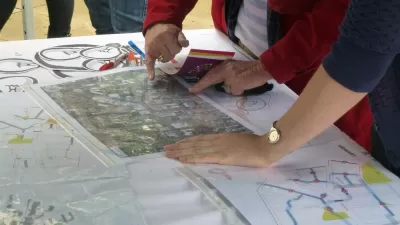As students have been choosing classes over the last year, one question I’ve received is: how important is the teacher vs. the subject matter? In general, I argue, your own attitude is the most important factor in how well you learn. However, truly terrible teaching can make that more difficult and truly wonderful teaching can change your life for the better.
As students have been choosing classes over the last year, one question I've received is: how important is the teacher vs. the subject matter? In general, I argue, your own attitude is the most important factor in how well you learn. However, truly terrible teaching can make that more difficult and truly wonderful teaching can change your life for the better.
Producing your own learning: Onone hand, as I have outlined in an earlier blog (http://www.planetizen.com/node/28094),"it is a misunderstanding to see students as primarily consumers of instruction. Rather the best students collaborate with faculty and other students to produce their own learning." Your own attitude matters a lot. Can you work out how to make this class work for you? If not, don't take it. If it's a required class, then you may want to rethink your choice of programs.
Truly awful teachers: Of course, we have all had truly dreadful teachers--those who kept the class going at a snail's pace, spent an inordinate amount of time flirting with students, read every bullet-point on each PowerPoint slide verbatim, came to class totally unprepared and filled the time by either reading aloud 30-year old lecture notes or their favored students' recent papers, taught only one narrow aspect of the issue with one painful technique, or rarely came to class at all communicating remotely from the sites of various international gigs. And while some such instructors may eventually help you learn, many do not. Fortunately, there seem to be fewer of these folks today; universities do more coaching and provide more support than in the past.
Leaning to learn with people who are not like you: However, learning in a classroom setting is a complicated task because you need to interact with students who are approaching the materials differently .Students have varied backgrounds, interests, and learning styles. Some need to hear the material, others to read it or see visual representations, still others to engage with it in a problem solving manner. Some students want an orderly progression and others need to dip into the materials from multiple angles. Better teachers allow students to engage with materials in different ways--in the classroom or through other exercises and assignments--but this means that there will always be something of a mismatch with some students for some activities. I see this as an advantage for planners--if you think your classroom is diverse, wait for the world of planning practice! However, this mismatch can irk some, particularly those who think their learning style is best. Even the best, multi-award-winning teachers will have some students who dislike their classes for these reasons.
Institutions that value teaching: Are some institutions better at producing quality instruction? Having worked and studied at a fairly large number of institutions I can say from experience that the value placed on good teaching varies. However, it does not have a clear relationship with the value placed on research or other activities. One of the places where faculty members were most competitive in terms of teaching was one of those most well known for scholarship, for example. In addition, due to the changing culture of universities in general, most faculty members below 50 have had to articulate a philosophy of teaching based in educational theory. They have had to demonstrate some level of competence in having students learn. This is not the same as having glowing student evaluations because these can be manipulated. Such evaluations also vary with the difficulty of the material, size of the class, level of choice students had in taking the class, and faculty demographics. Overall, while it can be said that there are teaching institutions (where faculty teach a lot of classes) and research ones (where they do less of this), the implications for teaching quality are complex.
The bottom line: In the end, students need to be aware of their own needs and styles of learning. As I said in my earlier blog [http://www.planetizen.com/node/28094]:"Certainly, program quality and faculty expertise matter to students. However, there is a big gap between the competent or even inspired delivery of instruction and the production of learning in an individual. Ultimately, that involves a commitment on the part of the learner."
At this time of year I am also getting a lot of questions about how to find the right planning program. I've provided advice on this before:http://www.planetizen.com/node/38163.My advice on writing statements of purpose also provides links to other relevant blogs:http://www.planetizen.com/node/39775. Relevant to this month's topic is a reminiscence of Peter Marris that I wrote three and a half years ago upon his death which still seems to me to have been too soon: http://www.planetizen.com/node/25428

Planetizen Federal Action Tracker
A weekly monitor of how Trump’s orders and actions are impacting planners and planning in America.

Maui's Vacation Rental Debate Turns Ugly
Verbal attacks, misinformation campaigns and fistfights plague a high-stakes debate to convert thousands of vacation rentals into long-term housing.

San Francisco Suspends Traffic Calming Amidst Record Deaths
Citing “a challenging fiscal landscape,” the city will cease the program on the heels of 42 traffic deaths, including 24 pedestrians.

Amtrak Rolls Out New Orleans to Alabama “Mardi Gras” Train
The new service will operate morning and evening departures between Mobile and New Orleans.

The Subversive Car-Free Guide to Trump's Great American Road Trip
Car-free ways to access Chicagoland’s best tourist attractions.

San Antonio and Austin are Fusing Into one Massive Megaregion
The region spanning the two central Texas cities is growing fast, posing challenges for local infrastructure and water supplies.
Urban Design for Planners 1: Software Tools
This six-course series explores essential urban design concepts using open source software and equips planners with the tools they need to participate fully in the urban design process.
Planning for Universal Design
Learn the tools for implementing Universal Design in planning regulations.
Heyer Gruel & Associates PA
JM Goldson LLC
Custer County Colorado
City of Camden Redevelopment Agency
City of Astoria
Transportation Research & Education Center (TREC) at Portland State University
Jefferson Parish Government
Camden Redevelopment Agency
City of Claremont






























